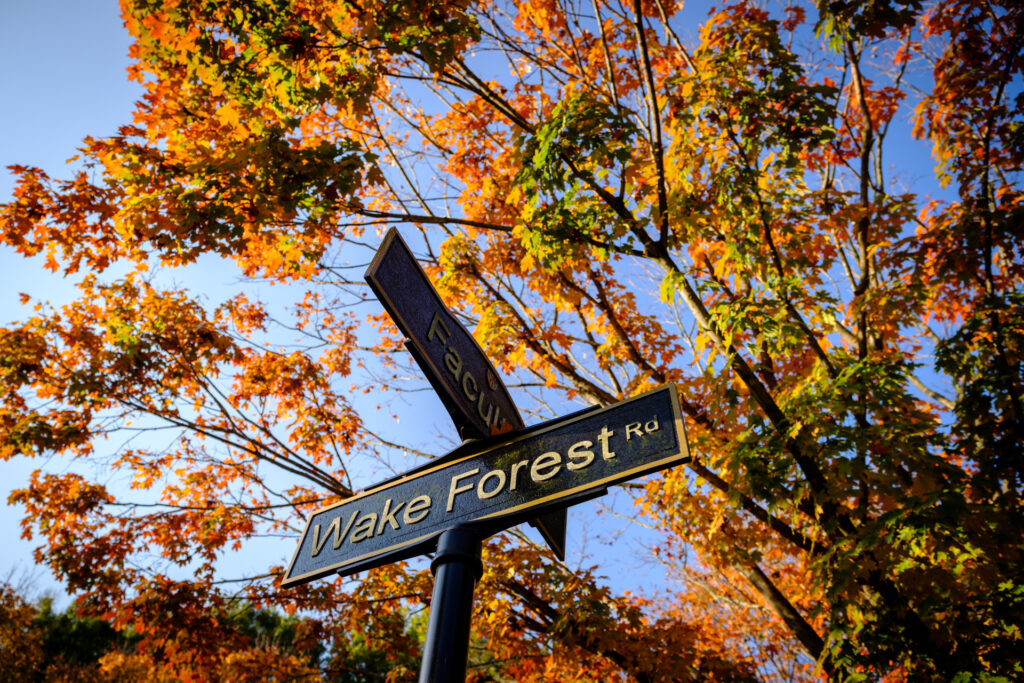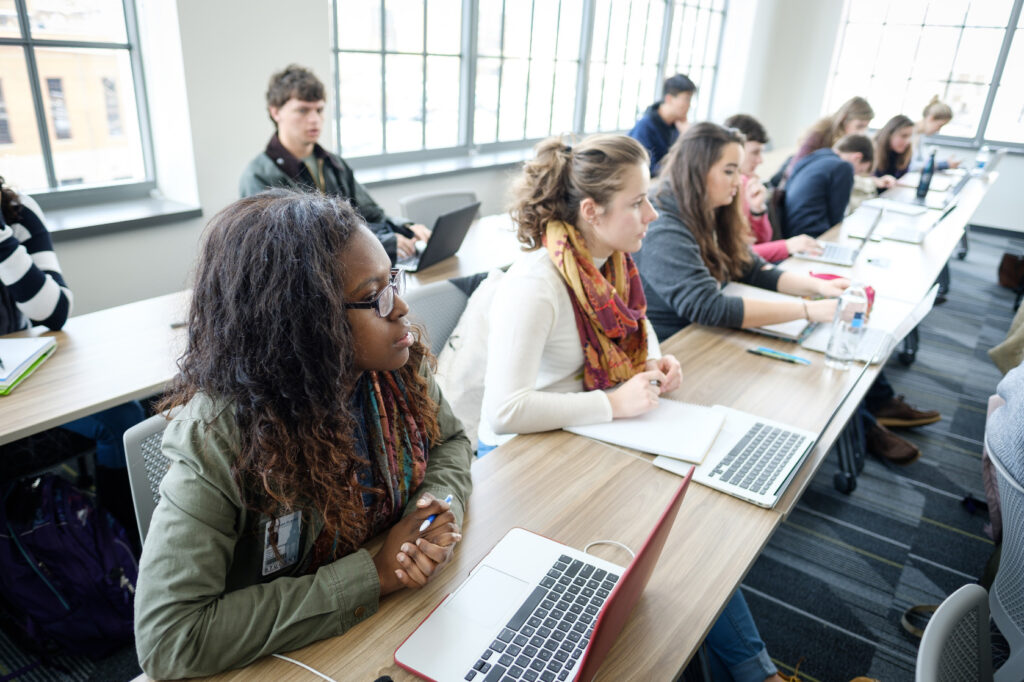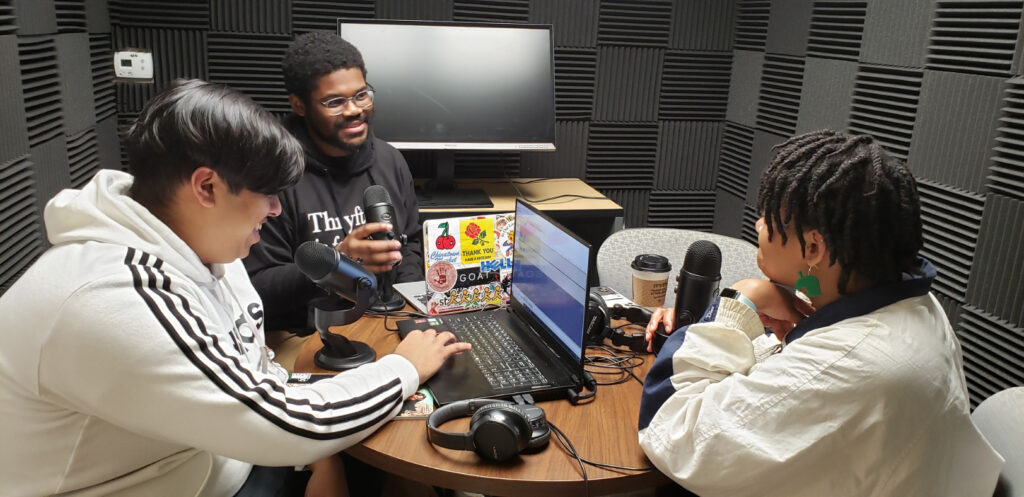Teaching & Academic Excellence
II.
Teaching & Academic Excellence

Key Initiatives
Providing Tools, Access, & Spaces
Building Blocks
Pedagogy, technology, and space work together to enable learning. The Learning Spaces Committee equipped classrooms to meet the needs of our dynamic and diverse curriculum. Working with faculty and utilizing spatial data gathered, classrooms have been updated with new easy-to-use technology unique to the needs of the faculty and the courses being taught in that space. This methodology has made it possible to touch nearly every classroom within a five year upgrade process, providing our faculty with robust technology to enhance their teaching.
As multimodal storytelling becomes more ingrained in the curriculum, it created a unique opportunity to develop supportive spaces and programs. Our OneButton Studio provides a dedicated space for students to create video recordings utilizing an easy-to-use format so the focus is on their work and not on the tool.
The Technology Accessibility Team, accessibility website, and Working Group were created to lead and assist in the effort to promote that our technology, as well as the digital content created using new technology, is accessible to people with a diverse range of hearing, movement, sight, and cognitive abilities.

Providing the most robust computing technology to our campus through our WakeWare and Faculty/Staff Exchange programs is critical for learning and teaching excellence. Each year, we evaluate the computing landscape and include the best technology in our computing options. Students must be prepared to succeed regardless of their major and faculty need access to reliable and secure technology for their work. The use of tablets as primary computing devices is being analyzed as a future option. Renovating our MacLab with new equipment, including 16 iMacs and functional furniture, will ensure there is always a dedicated, reliable computing space for the campus community.
Classroom technology will continue to be evaluated with a focus on agnostic technology and a simplified user experience. Future updates to our wireless infrastructure in addition to equipping spaces with an easy solution for live streaming will enable our faculty to connect with a broader audience and capture classes for an enhanced learning experience.
Expanding Academic Technology’s reach into the classroom will enhance our students’ digital literacy. Offering a First Year Seminar dedicated to learning multimodal storytelling and other 21st century communication methods ingrains these ever-important skills early in students’ academic careers. Working closely with students by co-teaching certain digital assignments or courses will enhance learning outcomes and project deliverables. The work that began with the creation of the Technology Accessibility Team will be expanded to address captioning solutions. An adopted Technology Accessibility policy and related procedures will provide guidance on specific practices, such as document and web page accessibility. Education and awareness is paramount in attaining a fully inclusive campus environment.
Keeping Up with Evolving Technology
Building Blocks
We implemented several new tools that meet faculty needs and provide a better teaching and learning experience. We now have a modern Learning Management System that works nicely with Kaltura, a platform which allows faculty to store, publish, and stream videos, video collections, and other rich media right from their Canvas course. Using WakeSites, Google Sites, and Adobe Spark Page, our campus users can create dynamic websites with simple drag-and-drop functionality for multimodal storytelling and more. With the creation of the Technology Consultant Program, students have the opportunity to enhance their digital literacy skills and leadership capabilities while building an e-portfolio.
A new Digital Pedagogy Lab will provide a place for faculty to learn how to incorporate digital components into their classes, such as podcasting, video production, website creation, and more. As multimodal storytelling is further incorporated into the curriculum, the need for additional high quality audio space, such as a Whisper Room, will be considered to provide maximum space for creative opportunities.

Student involvement plays an essential and growing role in prioritizing new initiatives, gathering feedback on new services, and providing support. Input from the Student Technology Advisory Committee has been key in the redesign of the university software site, Software@WFU. We will continue to engage with this important group of students as they assist in setting priorities, defining requirements, and assisting with articulating standard technology components that contribute to their learning experience. The Technology Consultants will take on a bigger role in amplifying the work of the Academic Technology Team, providing individualized support for students working on class and creative projects. Promotion of the Adobe Suite through the Adobe Ambassadors Program will increase campus adoption. Adobe Ambassadors will be responsible for designing, marketing, and conducting workshops and other training experiences. These enhanced opportunities for students will showcase their talents and allow them to build an impressive portfolio to take with them after graduation. Members of the student-lead group, The Media, will continue to work with and explore new and experimental technologies, providing important feedback for future initiatives. These opportunities not only benefit the University, but they provide our students with experience in leading projects, educating others on new technologies, and building confidence in their abilities to take on new challenges.
Building on our robust network infrastructure and dense wireless implementation, we continue to evolve the user experience, both in the learning spaces and in the student residences. Recent improvements deliver more redundancy to areas of the campus further from the central core and a project is underway to enable students to connect a wider variety of devices to our residential network.
Expanding support of our campus is always at the forefront of our effort. Utilizing the talents of the Data Analytics team will provide us with the information needed to make informed future decisions related to implementing new tools, vetting and integrating third party applications to meet unique faculty needs, and increasing support for existing tools such as Canvas and Kaltura.

